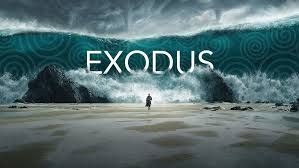The CRCA
Exodus
Humans are basically good. That myth is often trotted out to make us feel good about ourselves. The newspapers lead me to question that. A recent front-page article reported that our Deputy Prime Minister sent someone a text message claiming our Prime Minister is a hypocrite and a liar. That message, apparently sent some years ago when the deputy PM had been consigned to the backbenches, was leaked to the media. The deputy PM had to eat humble-pie and apologise. Humans are basically good, we’re told... but even our society’s elite, those in national leadership roles, often trip up badly.
In case you’re tempted to think of this as just an isolated exception let me share some other items from the same newspaper. Yet another popular TV star has hit the wall after a downward spiral involving drugs. Page two is taken up entirely with government Crime and Corruption Commissions (CCCs) in two Australian States. Stone the crows; why do we need CCCs if people are basically good. And when a judges serving on a CCC is not squeaky clean either, that should really make us stop and think about the myth of basic human goodness.
Or consider other items from that same newspaper: The threat of Russia invading the Ukraine and tensions in the Middle East; or Myanmar’s junta filing charges against Aung San Suu Kyi and North Korea continuing its belligerent threats to world peace. Even the reported opening of the Winter Olympics in Beijing came in the context of threatened boycotts over China’s poor human rights record. By the time I finished reading my paper I no longer have much confidence in the claim that we humans are basically good.
Of course the best myth-buster of human goodness is the Bible. Just the opening book of Genesis does a pretty good job of blowing that theory out of the water. The first two chapters are fine. Human beings, we are told, were made good and in God’s image. It’s in Genesis chapter three that the rubber hits the road. Adam and Eve rebel against their maker – and the rest, as they say, is history. Genesis then proceeds to show us the sad results of our fallen human nature. Adam and Eve are kicked out of Paradise. Cain kills his brother Abel. Abraham lies about his wife. Jacob steals from his brother and deceives his blind father. Jacob’s sons sell their brother, Joseph, into slavery in Egypt. Not surprisingly, the book of Genesis ends with a coffin full of bones. So much for us humans being basically good!
Thankfully, the Bible has more to it than just the book of Genesis. Exodus, the next book, is a wonderful picture of redemption; of God achieving what we human beings cannot achieve. Exodus begins with the depths of human misery: a slave people oppressed by the king of Egypt. Loaded down with the heavy burden of slave labour their babies are being drowned in the Nile River. It’s a fitting symbol of where our so-called inherent goodness gets us.
The wonderful message of Exodus is that God cares. God cared for that despised slave people in Egypt. He saw their tears and heard their cries. And He did something about it. God raised up Moses to tell Pharaoh to let the Hebrew people go. He sent ten plagues on Egypt when Pharaoh, instead of letting the people go, made their burdens even heavier. It was only after the tenth plague – the death of the first-born that Pharaoh let the people go. Then for forty years God led them until they became a nation ready to enter the Promised Land.
There are no hints in the book of Exodus that humans are basically good. What you do find is story after story of a compassionate God who cares for a stubborn people as He moulds them into the nation He wants them to be.
Oh... and there’s one other things about Exodus. There are some wonderful parallels to a far greater deliverance than bringing a nation out of slavery and into the Promised Land. It took the death of his son for Pharaoh to let Israel leave Egypt. It took the death of God’s Son, Jesus, to deliver us from the mess we made of things and to get us on that journey to God’s wonderfully restored creation when Jesus returns.
John Westendorp
When you subscribe to the blog, we will send you an e-mail when there are new updates on the site so you wouldn't miss them.



Comments